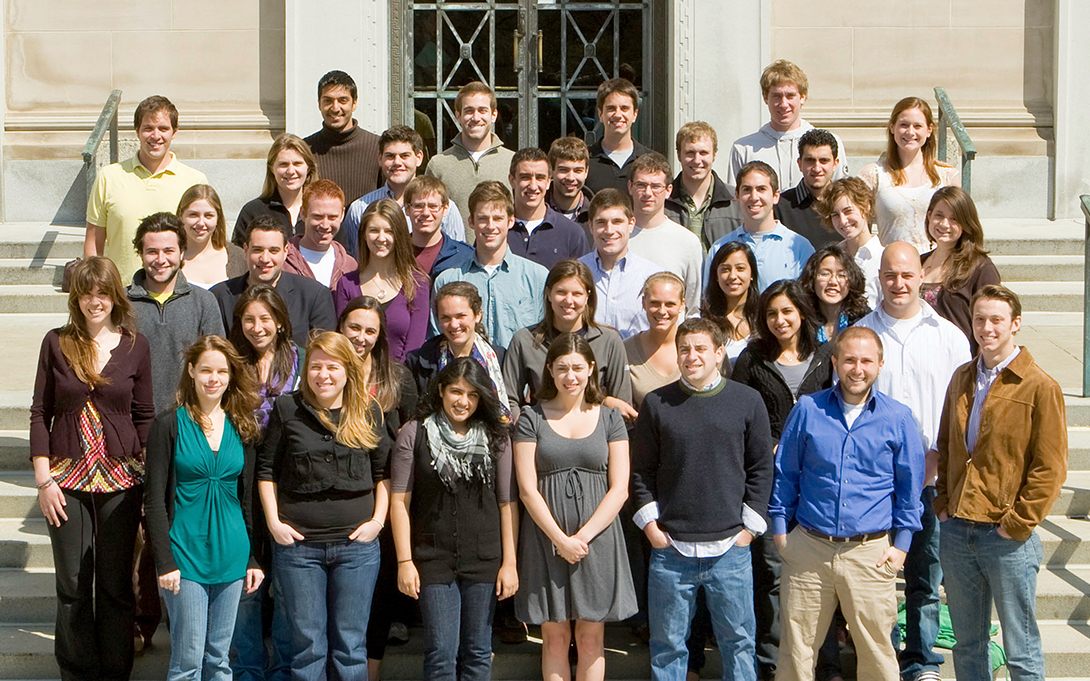
That first cohort of 58 graduates has been out in the world for a decade now. The degree has led them to a diverse array of careers–on Capitol Hill, in classrooms, at hospitals, at nonprofits, and at law firms.
In 2009, the first group of students to earn a bachelor’s degree in public policy from the University of Michigan walked across the commencement stage at Rackham. They had earned a liberal arts degree steeped in the social sciences. They were equipped, the program’s creators hoped, with the skills to think critically, to write well, and to devise solutions to public challenges.
Ten years out, graduates include analysts, consultants, lawyers, and high school teachers. They include the chief of staff for a Member of Congress, an assistant attorney general, and a judge.
“It’s an interesting mix of jobs, which is what I hoped would happen,” says emeritus professor John Chamberlin as he looks over the list of where graduates work today. As the founding director, he shepherded the inaugural class through the program, with a hand in admissions, curriculum development, and advising.
A rigorous liberal arts degree with an intense focus on writing, a BA in public policy trains people to think, maintains Chamberlin. The coursework embraces the complexity of policy issues and challenges students to think about the whole problem. This approach was very attractive to students from the start, Chamberlin says.
Policy seminars, each crafted around a specific topic, became a hallmark of the program, as did the requirement to identify a focus area.
“Importantly, these interdisciplinary seminars offer students practice in analyzing controversial issues from a multitude of perspectives—a critical part of effective problem-solving in the real world,” said Sharon Maccini, current BA program director.
The small class size for seminars (the seminars were capped at 25 students at the beginning of the program, and now average just 20 students) is remarkable at a large university. It allows for individualized attention from teachers, such as detailed, extensive feedback on writing and high expectations for class participation.
The students who were here in 2007 had rarely experienced such a learning environment. It clicked. Between the bright students (Chamberlin recalls faculty raving about and a bit amazed by the students in the early years) and dedicated faculty, “the chemistry worked,” says Chamberlin. Weill Hall, which opened just a year before the Class of 2009 entered, helped with that chemistry as well.
Elizabeth Brouwer (BA ’09), currently pursuing a PhD in pharmacy at the University of Washington, was on track to get a degree in political science before the Ford School BA started. Hoping to work in DC, she opted for a degree that promised to be less theoretical and more applied.
Brouwer recalls that in an early class at the Ford School daylight savings time was explored as an example of an issue with strong sentiments on both sides and far-reaching implications. “I knew I was in the right program at that point because I was learning about people who literally controlled time!” she quips.
From the start, the program gave students access to faculty who would push them to work hard as well as practitioners who could teach from experience.
“Congressman Joe Schwarz and Professor Rusty Hills’ insight into public policy, the political system, and campaign management based on their previous experiences was unmatched,” says Drew Renacci (BA ’09), now a senior associate at Squire Patton Boggs.
At the heart of the instruction, reflects Chamberlin, is the notion that good ideas aren’t enough to change things. Students are asked to wallow in the complexities of governing: stakeholder perspectives, political realities, and effective implementation. The coursework explores, for example, why ideas that seem good in theory (or at least, become law), sometimes do not pan out in execution.
Borovitz as the BA student speaker, 2009 commencement 
Thinking about things deeply and from different angles has helped Jeremy Borovitz (BA ’09) in his winding career path. “It was the Ford School that gave me the support to think about policy and its effects, but to think about it in a way that made sense for my life,” he says.
Borovitz, too, thought he was bound for Washington when he entered the program. His passions, along with encouragement from Ford School mentors, led him instead to apply to the Peace Corps. After his service, he remained abroad and is now a rabbi living in Berlin.
“What I learned in the Ford School about analyzing and writing policy is still a part of my everyday life,” he writes. “How do we define the strictures of our community? How do we determine the pillars upon which our community will stand? How do we balance a reverence for tradition with a commitment to openness, one that reflects our modern-day sensibilities and realities?”
Class of 2009, we’re proud of how you write, how you think, and how you’re making a difference in your communities!
Below is a printed version of this edition of State & Hill, the magazine of the Ford School. View previous editions.